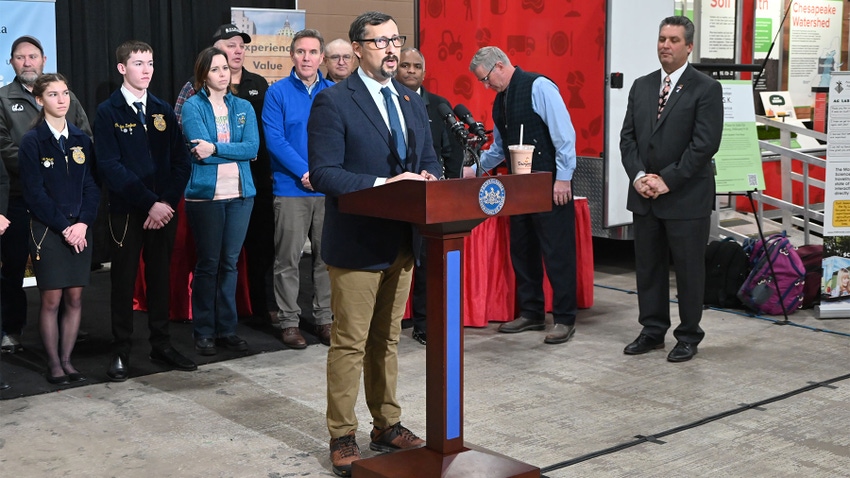
The regional administrator for the Environmental Protection Agency says his office is ready to work with farmers on meeting the region’s water quality goals, even as next year’s deadline to comply with nutrient load targets for the Chesapeake Bay likely won’t be met.
“Our posture has not been to have a heavy hand but a helping hand, so that’s why we’ve engaged closely with Farm Bureau because our goal is just for farmers to be in compliance,” said Adam Ortiz, administrator for EPA Region 3, speaking at the Pennsylvania Farm Show with members of Pennsylvania Farm Bureau.
“We don’t want to get anybody in trouble. We don’t want to put anybody out of business because we know that it’s tough work in a tough industry, especially for small family farms.”
EPA has acknowledged that water quality goals for the Chesapeake Bay — set in 2009 with a goal of having pollution controls in place by 2025 — will not be met. A 2022 model run by the Chesapeake Bay Program showed that current pollution controls achieve only 51% of nitrogen reduction goals and 60% of phosphorus reduction goals for the bay watershed.
Pennsylvania, and particularly the state’s agricultural sector, is the largest contributor of nitrogen to the bay — largely because the Susquehanna River, the bay’s largest tributary, runs through the state. But the agency’s modeling has long been criticized for not fully accounting for farm best management practices (BMPs) that are already in place.
Still, environmental groups and other states in the six-state watershed have criticized Pennsylvania officials for not doing enough. In 2020, the Chesapeake Bay Foundation — along with Delaware, Washington, D.C., Maryland and Virginia — filed a lawsuit against EPA accusing the agency of failing to hold Pennsylvania accountable to its water quality commitments.
The lawsuit was settled last year after EPA agreed to “prioritize efforts” in certain Pennsylvania counties that contribute the most pollution or have the biggest impact on local rivers and streams.
The agency also agreed to evaluate farms to see if there is significant damage to water quality from manure generation, manure management practices or available storage capacity — and to possibly designate more farms as point-source polluters, meaning they would come under some sort of direct federal regulation.
Ortiz said farmers should take advantage of new funding available for BMP installation, particularly the state’s Agricultural Conservation Assistance Program, or ACAP, which was rolled out two years ago.
ACAP is a four-year $154 million fund that helps farmers install BMPs to protect water quality.
Chris Hoffman, president of Pennsylvania Farm Bureau and a hog and chicken producer from Juniata County, said there have been 667 ACAP applications submitted, representing $83 million. More than 360 projects totaling $40 million have been approved, and 216 projects are now under contract. About 21 projects have been fully implemented, he said.
The high interest in the program, Hoffman said, is proof that farmers want to do the right thing for their farms and conservation.
“That speaks to the success of agriculture embracing the opportunities to be able to make it better for the next generation of farmers coming on,” Hoffman said.
Ortiz said it shows that there is still a lot of pent-up demand for money to fund BMPs.
“It says that farmers are hungry to expand their ability to perform conservation and keep viable farms,” he said. “Those are not mutually exclusive, but sometimes we have to give folks a boost who are doing great things.”
How to apply for ACAP
In Pennsylvania, you must apply for ACAP through your local county conservation district.
The program provides grant funding to eligible projects through local conservation districts, but keep in mind that it is a reimbursement grant, and the amount of reimbursement is based on eligible costs submitted for an approved project.
Grants of more than $500,000 must be approved by the State Conservation Commission.
Grant priorities
Conservation districts have been instructed to give priority to applications based on the following conditions:
BMPs funded meet the goals of any applicable WIP or CAP plan.
The BMP is part of a conservation plan or AG E&S plan, and a manure management or nutrient management plan. Development of such plans shall be included in the application, if not yet developed prior to the application.
Priority is given to BMPs that implement best management practices for control of nitrogen or phosphorus or sediment.
All animal concentration areas on the farm must be treated to abate storm water runoff, loss of sediment, loss of nutrients from the ACA, or the implementation of such BMPs shall be included in an application for funds.
There must be proximity to surface waters, public drinking water sources, or karst geology with underground drainage systems or open sinkholes.
The project must meet the design and construction standards established by the commission.
Any other criteria considered by the conservation district, as applicable, and approved by the commission can apply.
Eligible costs
The following costs are eligible for grant money:
project design, engineering and associated planning costs
project construction or installation provided by a contractor, including labor provided by the applicant
equipment, materials and other components of eligible projects
post-construction inspections
Read more about:
Water LawAbout the Author(s)
You May Also Like






